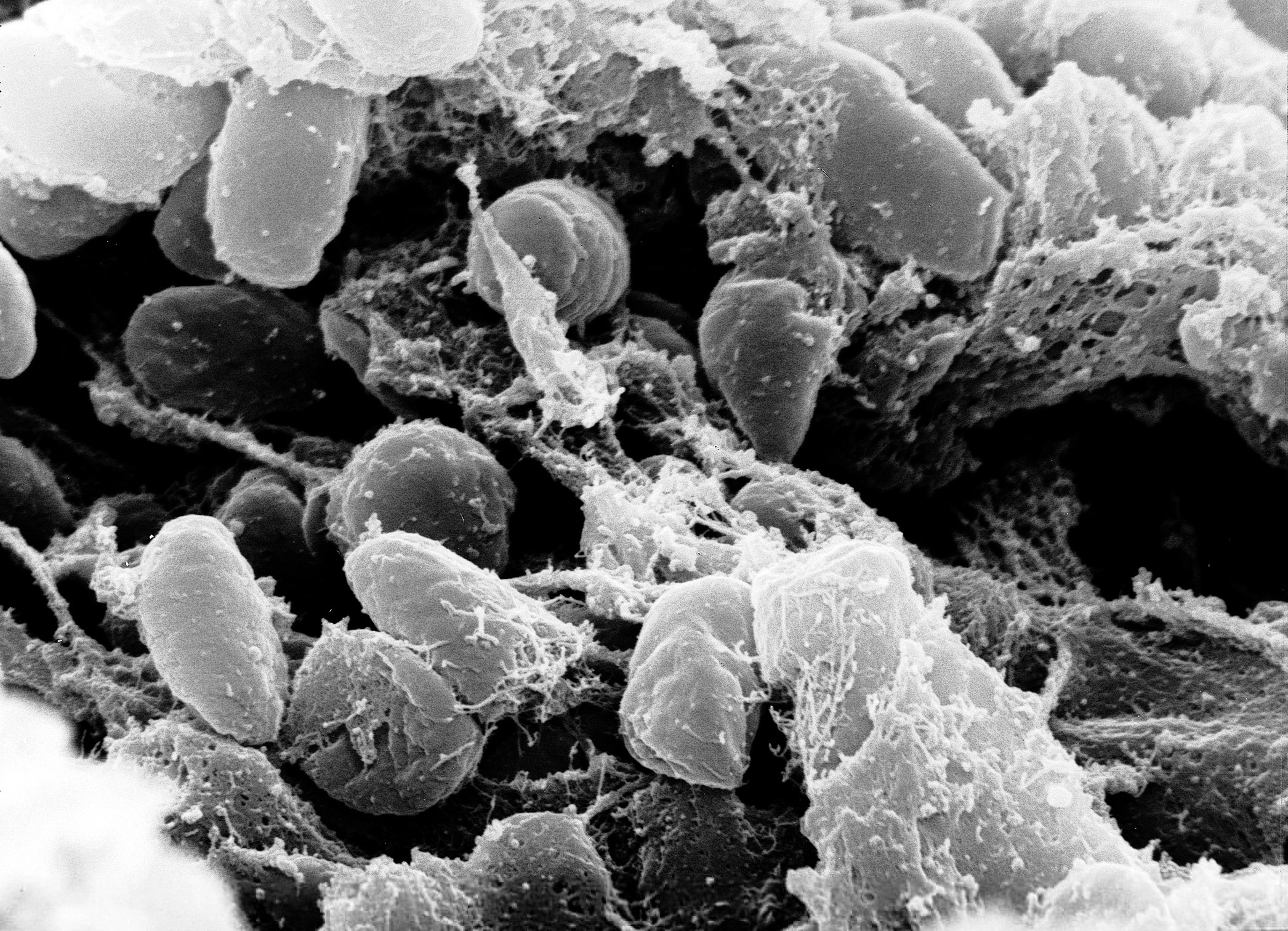Pneumonic plague
Editor-In-Chief: Prab R Tumpati, MD
Obesity, Sleep & Internal medicine
Founder, WikiMD Wellnesspedia &
W8MD medical weight loss NYC and sleep center NYC
| Pneumonic plague | |
|---|---|

| |
| Synonyms | N/A |
| Pronounce | N/A |
| Specialty | N/A |
| Symptoms | Fever, headache, weakness, cough, shortness of breath, chest pain |
| Complications | Respiratory failure, septic shock, death |
| Onset | 1 to 7 days after exposure |
| Duration | Varies, can be fatal within 24 hours if untreated |
| Types | N/A |
| Causes | Yersinia pestis |
| Risks | Contact with infected animals or humans, bioterrorism |
| Diagnosis | Culture, PCR, serology |
| Differential diagnosis | Pneumonia, tuberculosis, influenza |
| Prevention | Avoiding contact with infected individuals, prophylactic antibiotics |
| Treatment | Antibiotics such as streptomycin, gentamicin, doxycycline, ciprofloxacin |
| Medication | N/A |
| Prognosis | High mortality if untreated, better with early treatment |
| Frequency | Rare |
| Deaths | High mortality rate if untreated |
Pneumonic plague is a severe lung infection caused by the bacterium Yersinia pestis. Symptoms include fever, headache, shortness of breath, chest pain, and cough. They typically start about three to seven days after exposure. It is one of three forms of plague, the other two being septicemic plague and bubonic plague.
Causes[edit | edit source]
The cause of pneumonic plague is Yersinia pestis, a gram-negative bacterium. The bacteria are usually transmitted to humans through the bite of an infected flea. However, pneumonic plague can also be transmitted from person to person through respiratory droplets.
Symptoms[edit | edit source]
Symptoms of pneumonic plague typically begin within a few days of exposure to the bacteria. They include fever, headache, weakness, and rapidly developing pneumonia with shortness of breath, chest pain, cough, and sometimes bloody or watery sputum.
Diagnosis[edit | edit source]
Diagnosis of pneumonic plague can be challenging due to its rarity and the commonality of its symptoms with other conditions. However, it can be confirmed through laboratory tests such as blood cultures or sputum cultures.
Treatment[edit | edit source]
Pneumonic plague is a serious illness and requires immediate medical attention. Treatment typically involves antibiotics such as streptomycin, gentamicin, or doxycycline. If left untreated, pneumonic plague can be fatal.
Prevention[edit | edit source]
Prevention of pneumonic plague involves avoiding contact with infected animals and taking precautions to prevent flea bites. In some cases, prophylactic antibiotics may be recommended.
See also[edit | edit source]
Search WikiMD
Ad.Tired of being Overweight? Try W8MD's physician weight loss program.
Semaglutide (Ozempic / Wegovy and Tirzepatide (Mounjaro / Zepbound) available.
Advertise on WikiMD
|
WikiMD's Wellness Encyclopedia |
| Let Food Be Thy Medicine Medicine Thy Food - Hippocrates |
Translate this page: - East Asian
中文,
日本,
한국어,
South Asian
हिन्दी,
தமிழ்,
తెలుగు,
Urdu,
ಕನ್ನಡ,
Southeast Asian
Indonesian,
Vietnamese,
Thai,
မြန်မာဘာသာ,
বাংলা
European
español,
Deutsch,
français,
Greek,
português do Brasil,
polski,
română,
русский,
Nederlands,
norsk,
svenska,
suomi,
Italian
Middle Eastern & African
عربى,
Turkish,
Persian,
Hebrew,
Afrikaans,
isiZulu,
Kiswahili,
Other
Bulgarian,
Hungarian,
Czech,
Swedish,
മലയാളം,
मराठी,
ਪੰਜਾਬੀ,
ગુજરાતી,
Portuguese,
Ukrainian
Medical Disclaimer: WikiMD is not a substitute for professional medical advice. The information on WikiMD is provided as an information resource only, may be incorrect, outdated or misleading, and is not to be used or relied on for any diagnostic or treatment purposes. Please consult your health care provider before making any healthcare decisions or for guidance about a specific medical condition. WikiMD expressly disclaims responsibility, and shall have no liability, for any damages, loss, injury, or liability whatsoever suffered as a result of your reliance on the information contained in this site. By visiting this site you agree to the foregoing terms and conditions, which may from time to time be changed or supplemented by WikiMD. If you do not agree to the foregoing terms and conditions, you should not enter or use this site. See full disclaimer.
Credits:Most images are courtesy of Wikimedia commons, and templates, categories Wikipedia, licensed under CC BY SA or similar.
Contributors: Prab R. Tumpati, MD

